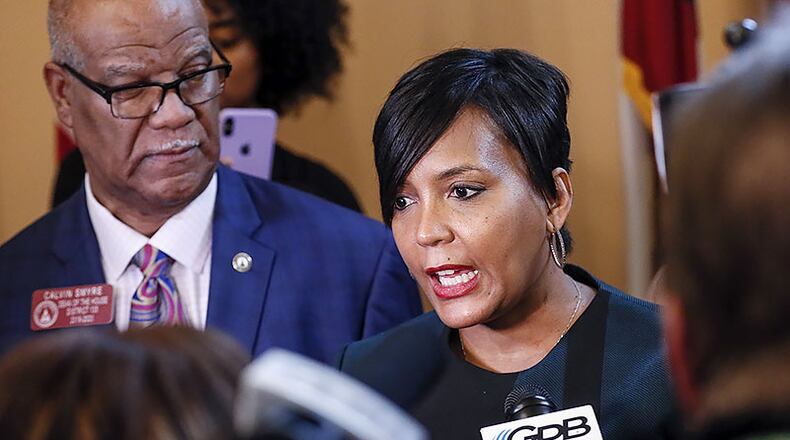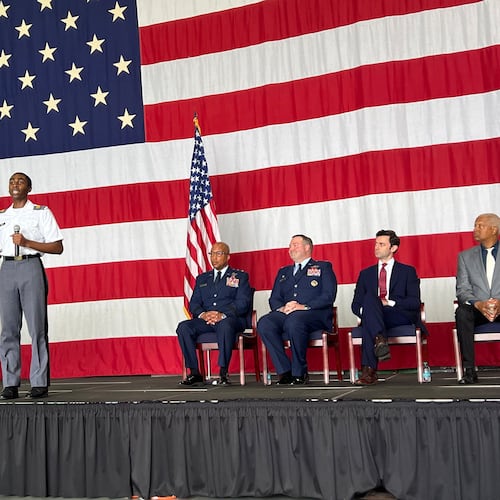Atlanta Mayor Keisha Lance Bottoms took the unusual step of issuing an executive order late Monday that asks the City Council to approve legislation that would create the Office of Inspector General, a new city position to combat corruption.
But mayoral orders are meant to apply for short periods of time, including during times of emergency, and must be upheld by the City Council.
Bottoms' order on the Inspector General has no binding effect, and added a layer of contentiousness to an important debate at a critical time: the start of a Georgia General Assembly session expected to feature another attempt by lawmakers to put Hartsfield-Jackson International Airport under state control.
Several city officials saw Bottoms’ order as politics masquerading as policy.
“The mayor should have written the council a letter,” said City Council President Felicia Moore. “I don’t know who is advising her, but [the executive order] was improper.”
A multi-year federal corruption investigation at City Hall that has resulted in guilty pleas and indictments of high-ranking bureaucrats and contractors. It has fueled arguments by state legislators that city officials can't be trusted with a valuable economic engine like the airport.
City officials hope that creating a powerful and independent Inspector General to investigate corruption and refer potential crimes to prosecutors will demonstrate that they are serious about cleaning up City Hall, and help frustrate any takeover effort.
But Bottoms’ executive order calls for placing the city’s two existing independent oversight agencies — ethics and audit — under the new Inspector General, and giving the IG control over their staffs. It’s a move both offices see as a threat to their independence.
“I don’t know how it purports to serve the public interest,” City Auditor Amanda Noble said of Bottoms’ order.
The auditor and ethics officer have jointly investigated issues surrounding Bottoms' administration, including circumstances surrounding her campaign staff being hired by the city, and paid with city funds before the mayor was sworn into office.
The inquiry found that the mayor’s campaign workers weren’t properly screened and were paid from restricted funds with no relationship to their jobs. It also found several of Bottoms’ campaign staff were compensated with city tax dollars for a pay period before they even submitted job applications.
The joint report confirmed most of the findings of an Atlanta Journal-Constitution investigation published in March.
Michael Smith, a spokesman for the mayor, said the decision to create the Office of Inspector General was driven by the recommendation set forth by the Task Force for the Promotion of Public Trust — established by Bottoms last year to make recommendations about the best measures for rooting out corruption, waste and fraud.
“This is no environment for half measures,” Smith wrote in an email. “The legislature and people of Georgia need to know that the City has made great strides in transparency and accountability, and an independent Inspector General with broad jurisdiction and subpoena power is the next and necessary step.”
All last year, city officials debated how to effectively establish an office governed by an independent board to investigate impropriety and corruption.
At times, politics infused the proceedings. The council passed legislation establishing an Independent Compliance Officer in March. Bottoms agreed to fund the office with $800,000 in this year's budget. Meanwhile, the task force recommended that the position's named be changed to an Inspector General that it be given authority, including subpoena power.
Councilwoman Jennifer Ide, who sponsored the compliance officer bill and is working with the Bottoms’ administration on the Inspector General ordinance, said Tuesday that specifics of how the IG office will function are still being finalized.
Former State Senator Vincent Fort first proposed an IG for the city in 2017 shortly before he announced his mayoral campaign. As the federal investigation heated up, other candidates including Bottoms, adopted the idea for themselves.
Fort said an effective IG requires the ability to issue subpoenas, compel testimony, refer matters for prosecution, and watchdog violations of the state’s open records law.
“Anything less than those four things makes it a paper tiger,” Fort said.
The city’s current draft ordinance is scheduled to be discussed at the council’s Finance Executive Committee meeting Wednesday. Officials expect a lively debate.
As for the mayor’s executive order, Ide said that it appears Bottoms was merely communicating her enthusiasm about the new position.
“I think it’s encouraging the City Council to pass the Inspector General position, which is what we are doing,” Ide said.
Ide confirmed that under the current draft legislation, the auditor and ethics boards would be merged into one entity but have separate governing committees.
She said the auditor and ethics officer would still operate independently and have control over their staffs. She also said that having all three offices under one umbrella would allow for better communication and coordination.
Everyone in the city worked collectively “to get this done early in the legislative session,” Ide said.
The original legislation drafted by Ide to create the IG position did not have either the auditor or ethics officer subordinate to the IG. It is unclear whether a majority of council members will support that move.
Nichola Hines, chair elect of the city’s Board of Ethics and Independent Compliance, expressed concern about the proposed legislation in letters sent Tuesday to Moore and Bottoms.
“The proposed legislation to establish the Office of Inspector General raises several concerns, the foremost being, the erosion of the independence of the Ethics Office,” Hines wrote.
Hines said that the role of the Inspector General was more prosecutorial and should focused on crimes. She argued that the IG and the ethics officer should be equals.
“The regulatory and advisory function of the Ethics Office cannot be subordinate to the investigatory function of the Inspector General and must be independent,” Hines said. “Furthermore, a horizontal structure removes potential bottlenecks from an already full pipeline of ongoing investigations which fall into distinct jurisdictional categories.”
What's next:
The Atlanta City Council’s Finance Executive Committee will debate the Inspector General legislation Wednesday. Because creating the position requires an amendment to the city’s charter, the legislation must undergo an extensive review process that requires three readings by the full council. The ordinance would receive its second reading Monday, if passed out of committee.
About the Author
Keep Reading
The Latest
Featured


